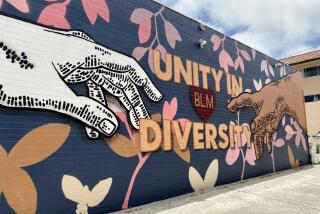Individualism Trumps Identity Politics
- Share via
Recently, the New York Times printed a surprising profile of French poststructuralist philosopher Julia Kristeva, in which she disavowed the political correctness and multiculturalism she is thought to have invented and bequeathed to the U.S. academics who have revered her ever since.
“Many of our American colleagues have taken what we proposed and have simplified it, caricatured it and made it politically correct,” she said. “I can no longer recognize myself.” Even more surprising, Kristeva denounced identity politics as “totalitarian” and undemocratic, since it tends to promote community interests and subvert individual freedom.
If you doubt that multiculturalism is headed in this direction, consider UCLA’s commencement exercises in which Latino, black and gay students, among others, held their own separate ceremonies, preferring to graduate in self-imposed isolation rather than communing with their fellow students of all races and sexual orientations. Surely this is Plessy vs. Ferguson, not Brown vs. Board of Education. Or have we since decided that separate can be equal after all? And if so, isn’t this a recipe for adversity, not diversity? Chauvinism, not multiculturalism?
Kristeva proposes something quite different. “I’d like my readers to ask ‘How am I special?’ ‘What individual spark do I have in my life, in my sexuality, in my spirit?”’
Exactly. Cultivating individualism is the way to bring about true multiculturalism, because healthy individuals cannot be broken down into their component parts, their jingoistic prides and jaundiced world views, whether of ethnicity, sex or sexuality. They are wholes, always greater than the sum of their parts, and this tends to make them much less susceptible to bigotry. The barriers between “us” and “them” collapse, as do caustic xenophobias that fuel most of the world’s ongoing conflicts, from Northern Ireland to Kashmir to the Middle East to Eastern Europe.
Again, if you doubt that the estranging quarantines of identity politics are this dangerous, you need only remind yourself that the race riots in northern England this summer are directly related to the rise of the British National Party, a watered-down version of its 1970s predecessor, the neo-Nazi National Front. The BNP’s rallying cry that England be for whites only won them votes in the June 7 national elections. Support for the BNP was strongest in towns like Oldham (16.4%) and Burnley (11.3%) where the worst of the rioting took place.
Ideas are inflammable. This doesn’t mean, of course, that they shouldn’t be expressed freely. But it does mean that, because philosophy and politics are inveterate bedfellows, an educated electorate has a duty to think through, to consider the ramifications--not simply the immediate rewards--of the trends its culture embraces and the programs its politicians espouse.
This is why it’s important to understand what’s troubling about the multiculturalism and so-called political correctness that began in humanities departments at our best universities and have spread in innumerable ways.
Diversity, in the true sense of the word, is good. No one committed to liberty and equal opportunity disputes that. Every fair-minded person wants America to live up to its promises. To be inclusive. To be sex-, class-, color-, race-and lifestyle-blind. The problem is that multiculturalism, in its current form--identity politics--has been having quite the opposite effect. It excludes. It estranges the very cultures it purports to integrate, by overemphasizing rather than de-emphasizing the categories that keep us from seeing each other as human beings. And only by seeing each other as unique, irreducibly complex individuals rather than as prototypes of gay, Asian American, bourgeois masculinity or straight, white, working-class femininity and so on--can we avoid the very separatist, clannish hatreds that are endemic to fascism.
Do I blame leftist academics for the world’s problems? Of course not. But as the French writer Julien Benda said, it is treasonous for intellectuals to lend themselves and their ideas to the base uses of tyranny. Perhaps it is time we thought more carefully about what multiculturalism really means and how best to achieve it.
More to Read
The biggest entertainment stories
Get our big stories about Hollywood, film, television, music, arts, culture and more right in your inbox as soon as they publish.
You may occasionally receive promotional content from the Los Angeles Times.










